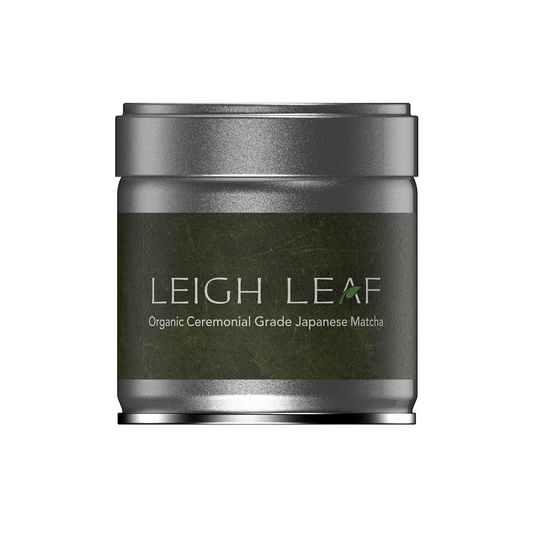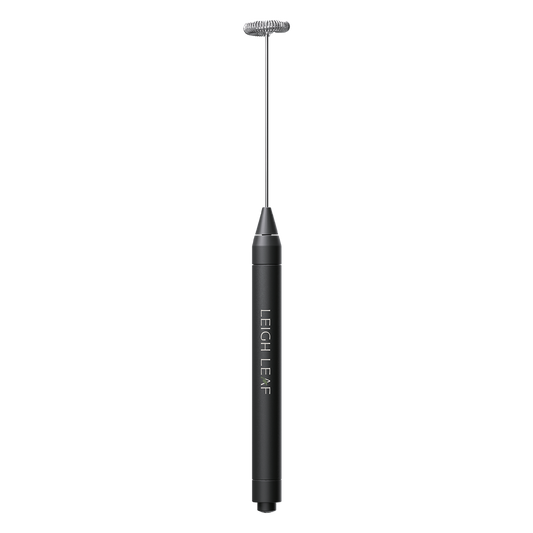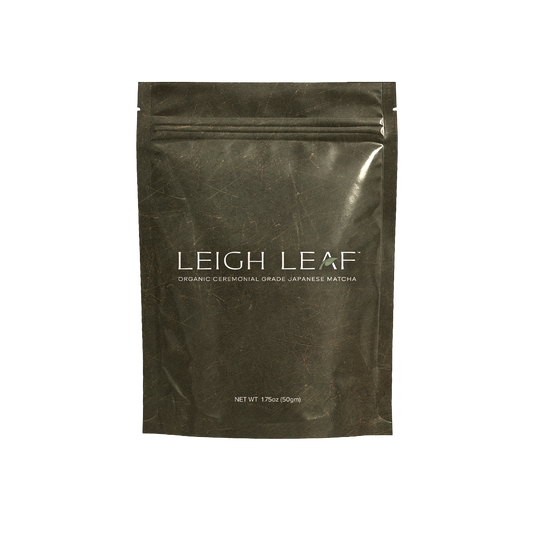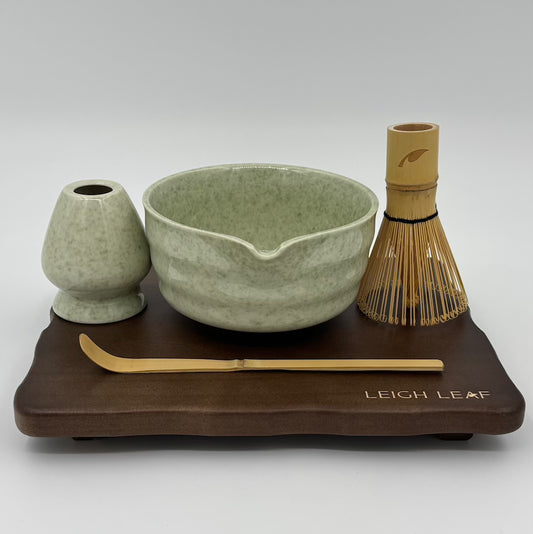
Getting Started with Matcha: 16 Frequently Asked Questions
Share
As one of the most vibrant green teas available, Matcha stands out for its flavor and potential health benefits. If you've found yourself intrigued by this green elixir but have a barrage of questions, you're not alone. Many common questions and curiosities surround Matcha, and we're here to unravel them for you.
Table of content
1. What Is Matcha Made of?
Unlike green tea leaves, matcha is more than just powder. Specifically, grown and processed green tea leaves are ground into a fine powder. The tea plants are shaded from the sun for about 20–30 days before harvest to increase chlorophyll levels, giving Organic Matcha its vibrant green color and enhancing its amino acid content. Grinding the leaves into a fine powder creates a fine powder.
Related Article: How is Matcha Made
2. Does Matcha Have Side Effects?
One common concern is whether Matcha has side effects. Moderate consumption of Matcha is generally safe for most people. Caffeine content, however, can cause side effects such as insomnia and increased heart rate when consumed in excess. It's advisable to enjoy Matcha sensibly, savoring its benefits without overindulging.
3. Does Matcha Suppress Appetite? Exploring Matcha's Role in Weight Management
Many people on a weight loss journey wonder whether Matcha suppresses appetite. While Matcha contains compounds that may promote feelings of satiety, it's not a magical solution for weight loss. Integrating matcha into a healthy diet and active lifestyle can complement your overall wellness goals.
4. Does Matcha Tea Make You Poop? Navigating the Digestive Effects
Digestive concerns are not uncommon when trying a new beverage. While some may experience a mild laxative effect due to the caffeine content in Matcha, it's generally not a cause for concern. Matcha may need to be moderated if you are sensitive to caffeine.
5. Is Matcha Anti-inflammatory? Exploring Matcha's Potential Health Boosts
The buzz around Matcha often includes its potential anti-inflammatory properties. Matcha contains catechins, which are natural antioxidants that may help fight inflammation. You can contribute to your overall health by including Matcha in your diet.
Related Article: Is Matcha Anti-Inflammatory?
6. Is Matcha Good for Detox? Separating Myth from Reality
Detoxification is a term often associated with Matcha, but it's essential to clarify what detox means in this context. Besides antioxidants, matcha also promotes the body's natural detoxification process. However, it's not a substitute for a well-balanced, healthy diet and lifestyle.
7. Is Matcha Good for Skin? Unlocking the Beauty Benefits
Additionally, matcha has other benefits besides its internal benefits. It has been suggested that matcha's antioxidants may prevent the skin from being damaged by free radicals. Including Matcha in your routine is the sip your skincare regimen needs.
Related Article: What Does Matcha Do for Your Skin
8. Is Matcha Good for Weight Loss? Debunking Myths and Setting Realistic Expectations
Weight loss enthusiasts often wonder if Matcha can be a secret weapon. While it's not a miracle solution, the combination of antioxidants and a modest caffeine boost may support a weight loss journey when paired with a healthy lifestyle. The key to losing weight is consistency - there is no magic potion.
Related Article: Does Matcha Help You Lose Weight?
9. Does Matcha Stain Your Teeth? Addressing Concerns About Dental Health
The vibrant green hue of Matcha might raise concerns about potential teeth staining. Good news: Matcha is less likely to stain your teeth compared to traditional green tea. As always, maintaining good oral hygiene practices helps keep your pearly whites gleaming.
10. Does Matcha Make You Nauseous? Understanding the Sensitivity Factor
Experiencing nausea after sipping on Matcha is uncommon, but everyone's tolerance differs. If you're new to Matcha or have a sensitive stomach, start with a small amount and gradually increase it. If nausea persists, it might be a sign that Matcha isn't the best fit for your digestive system.
11. Does Matcha Contain Sugar? Demystifying Matcha's Sugar Content
One of the beauties of Matcha lies in its simplicity—pure, powdered tea leaves without additives. Matcha itself doesn't contain sugar. However, be cautious when opting for pre-packaged Matcha products, as they may include added sweeteners. For a sugar-free experience, stick to pure Matcha powder.
Related Article: Does Matcha Contain Sugar?
12. Matcha Latte Without Sugar? Crafting a Healthier Sip
If you're a Matcha enthusiast looking to cut down on sugar, fear not. Crafting a Matcha latte without sugar is entirely possible. Replace sugar with honey or stevia to make your milk unsweetened. Consequently, Matcha's rich flavor can be enjoyed without added sugar.
13. Is Matcha Good for Energy? Tapping into the Caffeine Boost
The appeal of matcha lies in its ability to provide a gentle, sustained energy boost. Combined with L-theanine, matcha promotes alertness without giving you jittery feelings like coffee. It's a mindful energy choice for those seeking focus and clarity.
Related Article: Does Matcha Give You Energy?
14. Is Matcha Good for Stress? Embracing Matcha as a Calming Ritual
Beyond the buzz, Matcha offers a moment of calm. L-theanine in Matcha promotes relaxation without making you sleepy, allowing you to take a mindful pause in your busy day. Sip, savor, and let the stress melt away.
15. Is Matcha Vegan? Navigating the Dietary Landscape
The simplicity of Matcha extends to its vegan-friendly nature. As it's derived from matcha green tea leaves, Matcha is inherently plant-based. Matcha is easy to incorporate into vegan lifestyles, whether you are a dedicated vegan or just interested in plant-based foods.
16. What Is a Green Tea Shot? Is Green Tea Shot the Same as Matcha?
While both Green Tea Shots and Matcha originate from green tea, they differ in preparation and presentation. A Green Tea Shot typically involves mixing green tea with spirits like vodka and citrus flavors. On the other hand, Matcha is the pure, powdered form of specially processed green tea leaves. Each offers a unique experience—whether you're toasting with a shot or indulging in the rich, velvety Matcha goodness. You can learn more about matcha by visiting Leigh Leaf.
When you begin to explore the world of Matcha, brewing a cup of Matcha is just the beginning. It's an exploration of flavors, potential health benefits, and a mindful ritual. These common Matcha questions are your guide to unraveling the mysteries and making your Matcha journey not just enjoyable but informed and enriching. So, steep, sip, and savor the green elixir that is Matcha.




